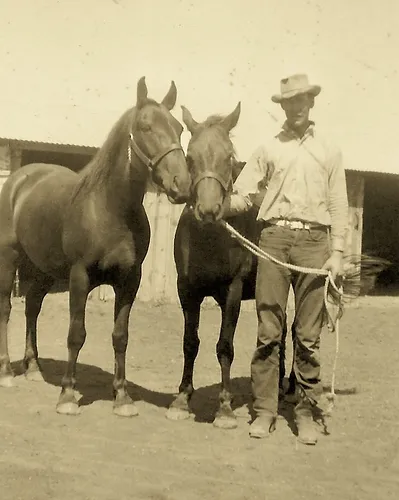Wales Denton Wenburg was born April 14, 1915 to Otto and Anna Wenburg in the small town of Belgrade, Nebraska. As a young man he worked the family farm until the passing of his father and the drought forced the family to sell the farm. Wales moved west to Laramie in 1938 where he took a job working for Mary Ethele Biddick at the Biddick Ranch north of Laramie. Wales was a tall man, about 6’4” and had a hard time finding jeans long enough to fit him, so he would stuff them in the tops of his boots. That and his bald head and large hands were his trade mark look.
Wales’ family worked the farm in Nebraska with draft horses they raised, and shortly after arriving at the Biddick Ranch, Wales encouraged Miss Biddick to obtain a draft stallion, so they could raise their own quality work horses. In those days, all the work was done with horse power. Working cattle, mowing, raking, sweeping, stacking, hauling and feeding cattle was all done with the horse and Wales could ask a horse or team of horses to perform many a task.
From that time on, Wales raised and worked quality Belgian draft horses on the ranch. In addition to the Belgians, Wales raised, and was very proud of the band of Morgan horses he rode and bred. For a time, he had a band of pony mares he crossed with Morgan stallions, and he also raised mules for a time. He understood and loved horses. For many years, he supplied horses and teams for the Cheyenne Frontier Days Parades, and it was quite common to see Biddick Ranch horses and buggies in the Jubilee Days Parade in Laramie.
When Wales arrived at the Biddick Ranch north of Laramie, he was pleased to see Shorthorn feeder cattle. He always loved the breed. The cattle at the ranch were infected with Brucellosis in those early days, so they tested all the cattle, sold the infected animals and started rebuilding. In the 1960’s when short compact cattle were becoming popular, he was not a fan, so he would travel to Canada to obtain the larger framed breeding bulls he preferred. The calves were loaded on railroad cars at Wyoming Station and shipped to Omaha, Nebraska in the early years, then later trucked to the Stockyards in Omaha. They regularly topped the sale.
Wales loyally worked for Miss Biddick until her passing in 1972. At that time, Wales had to disperse the cow herd to help settle the ranch estate. The whole shorthorn herd was dispersed with exception of 61 heifers that he retained to rebuild the herd he worked so hard to develop through the years. During those rebuilding years, Wales routinely summered 3 to 4000 yearlings to pay the bills.
Wales was always there to help the youth in the community. For years he was on the board of the Cathedral Home of Children, and occasionally he would take a youngster who may have struggled in school or just had life problems, and after some purposeful time at the ranch, many turned their lives around. Several young adults in the community are very thankful for the “leg up” he gave them as youngsters, and they and their families are now a part of the Laramie community.
He was a member of the Sertoma Club, and he and other ranchers in the area helped put on the Little Britches Rodeos in Laramie in the 1960’s. Wales was involved with 4-H in the county, and for years he would donate the pick of a registered Morgan weanling filly to a local 4-H’er who would write a letter to Wales explaining why and how they would raise a foal. The winning 4-H’er would then raise a foal from that filly and return a foal to Wales in several years. Several youngsters got their start in the horse business from this program.
He was also involved with the local Shrine Club. He and other members would donate cows and have a caravan across southern Wyoming to Salt Lake City, Utah where the proceeds from the sales of these cattle was donated to the Shriner’s Children’s Hospital.
Wales enjoyed having friends out for pancake dinners. When the Albany County Library moved to its present location, Wales held a fund raiser through one of his pancake dinners. He was a true friend of the Library.
In the ‘70’s, Wales and friends purchased small 12 to 13 hand horses throughout Wyoming and Montana, sent them to the ranch where the veterinarian blood tested them for Equine Infectious Anemia. Nonreactors were then sent to the Federal Center in Denver to undergo studies for the disease.
Wales donated to the Cowboy Joe Club Steer-a-year program that provided scholarships to student athletes from Wyoming, UW Agricultural judging teams and the UW Rodeo team. He was a member of the Wyoming Stockgrowers, Albany County Stock Growers, Wyoming Farm Bureau, Elks, Moose, and Morgan Horse Association.


